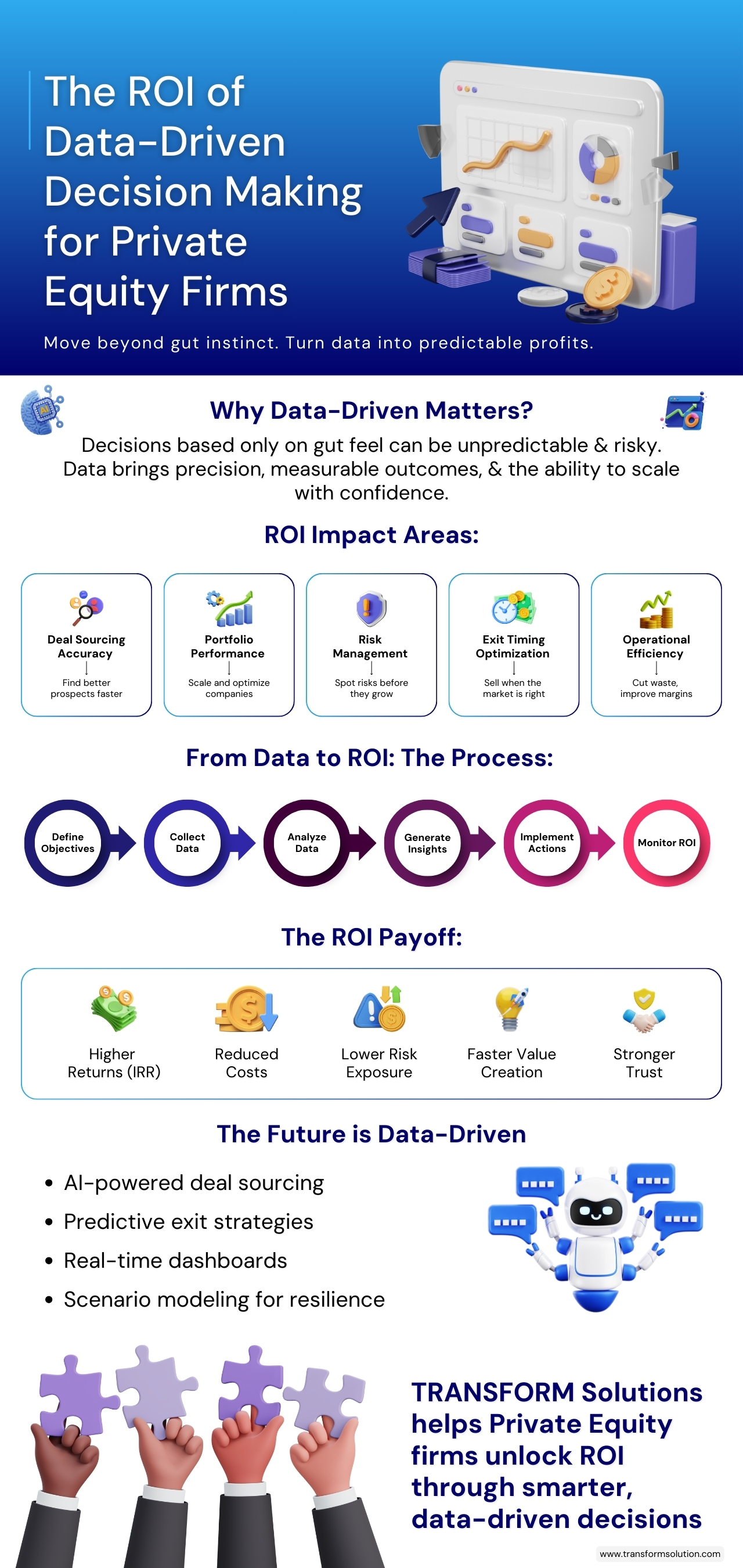
Private equity (PE)businesses work in one of the economy's riskiest sectors. Finding value in investments, producing precise points, and promoting performance enhancements across portfolio companies are essential for success. Historically, this has depended on financial models, industry knowledge, and intuition. Although these elements are still necessary, data-driven decision-making in business has emerged as a potent driver determining competitive benefit.
However, how do PE firms assess the success of these initiatives? Businesses can determine the financial advantages of data-driven decision making, operational effectiveness, risk reduction, and long-term value generation by looking at the ROI (Return on Investment). This blog examines the definition of data-driven decision making, its operation, real-world instances for private equity firms, and the direct correlation between ROI and more smart investment outcomes.

Data-driven decision-making (DDDM) is about using the data instead of depending on assumptions or gut feelings. Private Equity firms use real-time data, AI, and cutting edge analytics to find the best investments, grow their companies and know when to sell. DDDM offers greater insight into market potential, consumer behavior, operational inefficiencies, and growth prospects than just past performance or simple financials. In short, data transforms possibilities into predictable results and risks into quantifiable insights.
Before delving further, let’s establish a crucial foundation - what is ROI? One of the most well-known indicators of success in corporate strategy and finance is ROI. Fundamentally, ROI describes the value or profit made relative to the resources, time, or money spent. While a weak ROI may indicate inefficiencies or lost possibilities, an effective ROI indicates efficiency, profitability, and smart capital funding.
ROI is more than the money from concluding deals for private equity firms. It also concerns how well long-term value is being unlocked by applying tactics, tools, and procedures. Concerning data-driven decision-making, ROI is more than just digits; the quantifiable advantages occur when knowledge replaces assumptions. Companies save time, lower risk, and discover possibilities that might otherwise go overlooked when options are based on accurate, timely, and thorough data.
In reality, data-driven methods impact PE firms' return on investment in several ways.
To make data-driven decisions, you must follow a structured process that uses data throughout. For Private Equity firms, where millions or even billions of dollars are at stake, following a defined plan ensures they get precise and consistent results. There are six main steps to this process.
Every data project needs a clear plan from start. Companies must pose detailed queries, such as which sectors offer security for quick development, which businesses in the portfolio are malfunctioning and why, and which strategic or functional differences could instantly increase valuation multiples. Setting proper objectives ensures data initiatives are targeted and aligned with precise preferences.
After determining objectives, the next step is to manage structured and unstructured data. This data includes industry analyses, competitor benchmarks, CRM data, financial information, operating information, and other data sources like social media.
Then, use advanced tools like statistics, predictive modeling as well as AI-driven analytics to find new opportunities, identify risks, and discover what might happen next. This stage is where raw data becomes powerful intelligence for PE firms.
Data alone is insufficient. It must be reduced to actionable insights that support PE goals, such as strategic repositioning, cost optimization, margin expansion, or revenue development.
With the correct information, businesses may confidently invest in expansion, reorganize underperforming businesses, buy potential ones, or dispose of them as needed.
Lastly, performance is regularly monitored to make sure choices result in the desired effects. This shows a feedback loop highlighting the significance of data-driven business decisions and supporting goals.
PE firms are used to making decisions based on gut feeling or experience. Even with its benefits, this method has few drawbacks, especially in fast-moving markets. Depending on gut feelings can lead to missed opportunities, slow responses to market changes, unnecessary risks that better data could have been avoided with the use of better data.
Today's markets progress fast due to technical inventions, changes in customer behavior, and global financial uncertainty. Data-driven decisions are practical and require maintaining a competitive advantage in such a setting.
Machine learning models can process large amounts of data in seconds, something that would take a person weeks or months. This allows PE firms to quickly identify trends, look at potential deals, and make investment decisions without the delays of human analysis.
Predictive analytics tools look for early warning signs that could be easily missed. This allows companies to spot issues before it affects performance, by identifying inefficiencies, drop in demand, or noticing red flags in a potential business.
Data provides further insight into a portfolio's companies. Although financial reports deliver top-line insights, analytics go deeper and reveal operational inefficiencies, blockages, and lost revenue options that may be set to improve overall profitability.
Lastly, data-driven private equity companies have a considerable advantage over competitors. They regularly seize value that competitors overlook by spotting hidden trends and seizing good possibilities early on, which boosts ROI and fosters long-term success.
PE firms employ AI-driven tools to monitor early-stage startups, scan industries, and identify underperforming assets ready for acquisition rather than relying only on negotiated deals. This lowers sourcing costs while expanding the pipeline.
Financial health is the only aspect of data analytics. It evaluates supply chain vulnerabilities, workforce productivity, and customer deterioration rates. By identifying hidden hazards early, businesses can save millions after an investment.
PE firms may help portfolio companies make data-driven business decisions that raise value multiples by monitoring real-time KPIs like sales conversion or operational efficiency.
Predictive modeling analyzes customer demand, competitor actions, and market cycles to decide the best time to exit. This ensures that companies will not lose money.
ROI for PE businesses can take many forms.
It's important to remember that human judgment is not replaced by data-driven decision-making in business. The top PE companies combine industry knowledge with data insights. Skilled partners contribute negotiation skills and invention, while data highlights trends and possibilities.
The winning formula is data + experience =superior ROI.
Despite the apparent advantages, PE firms may encounter challenges.
The PE landscape is changing due to emerging technologies, including artificial intelligence (AI), natural language processing, and predictive modeling. In the coming years, expect:
For PE firms, data-driven decision-making is becoming a competitive must rather than an option. Data helps companies be more accurate, reduce risks, and increase profits in all areas, from finding new deals to planning exits.
Companies that invest in data driven decision making, achieve stronger financial outcomes, faster growth, and more trust from their partners.
Smarter data translates into smarter earnings, as demonstrated by the ROI.
At TRANSFORM Solutions, we help private equity firms use data driven decision making to their full potential. Our tools, custom dashboards, and predictive models help you to find hidden value, reduce risks, and improve portfolio. If you want to make smart, data-backed decisions, let us help you boost your return on investment. Contact us right now to learn how we can assist you in creating data that is the most beneficial investment in your business!
Trust TRANSFORM Solutions to be your partner in operational transformation.
Book a free consutation